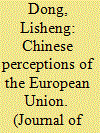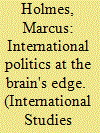| Srl | Item |
| 1 |
ID:
131646


|
|
|
|
|
| Publication |
2014.
|
| Summary/Abstract |
This article uses survey data collected in 2010 and conducts a systematic comparative analysis of the perceptions of the EU by the Chinese general public and the elite. Most ordinary Chinese citizens do not understand the EU very well, but their impressions of the EU are very positive and they also hold good expectations for the future of China-EU relations. The Chinese elites and ordinary citizens differ significantly in terms of 'favoring the EU' or 'favoring Russia'. The multivariate model indicates that EU travel experience, annual income level and Internet dependence have significant positive effects on 'favoring-EU' feelings. Those who have EU travel experience, higher levels of annual income and greater opportunities to obtain information via the Internet are more likely to be 'favoring-EU'.
|
|
|
|
|
|
|
|
|
|
|
|
|
|
|
|
| 2 |
ID:
132374


|
|
|
|
|
| Publication |
2014.
|
| Summary/Abstract |
Social neuroscience has seen a profound rise in other social science disciplines, such as economics, yet there has been relatively little systematic analysis of the usefulness of social neuroscience for international relations and the study of world politics. This article suggests that while there are many potential explanations for why this might be the case, one important barrier to adopting neuroscience may be our metaphysical assumptions and philosophical wagers. I suggest that if all politics is rooted in the brain, then two distinct arguments regarding agent-structure are plausible. One argument suggests that structure becomes redundant once the brain is accounted for; the other suggests that the brain simply drops out as epiphenomenal. After all, if all politics is reflected in the brain, then the brain itself is less interesting than the structure being reflected. These wagers ultimately relate to positions we take on the mind-body problem and well-known ideational-material divide. New research in neuroscience and philosophy of mind suggests that this binary distinction can be overcome, suggesting a new "via media" between ideas and material that may offer significant promise for both theory and practice.
|
|
|
|
|
|
|
|
|
|
|
|
|
|
|
|
| 3 |
ID:
082081


|
|
|